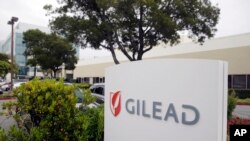An American biotech company has halted “compassionate use” approvals of a drug being tested as a potential treatment for COVID-19 but says it is working with the U.S. and other countries to make the experimental drug more widely available.
Remdesivir, a drug initially developed to treat Ebola, is undergoing a number of clinical trials in the U.S. and elsewhere to determine its safety and efficacy against the coronavirus-borne disease, with the first results expected in the coming months.
Hopes were raised for the drug after it was administered to a patient in the United States in January. That patient, the first in the U.S. with no known contact with an overseas source of infection, showed signs of improvement within 24 hours of receiving the drug.
Overwhelmed with requests
Since then, Gilead Sciences of California has made the drug available to about 250 individuals in the United States, Japan and Europe under “compassionate use” procedures that allow the use of a still unapproved drug when no viable alternative is available.
But the company says it has been overwhelmed with such requests and has temporarily halted the process. Meanwhile, it says it is seeking to transition to “expanded access programs” where it can make the drug available to a wider patient population, both in the United States and abroad.
Shortly after the American patient was treated with remdesivir in January, Gilead worked with U.S. authorities to ship enough remdesivir to China to allow up to 500 patients to participate in clinical trials carried out in hospitals in Wuhan.
Those trials began in early February but no results are expected until late April or early May because of “masking,” which means researchers will not know until then which patients received the drug and which ones received a placebo.
Clinical trials held
Gilead launched its own clinical trials earlier this month involving 1,000 confirmed COVID-19 patients in a total of 17 locations including South Korea, Singapore, Hong Kong, Taiwan and several American states. Those trials are not masked so the results will be available more quickly.
Separate clinical trials by the U.S. National Institute of Allergy and Infectious Diseases (NIAID) are aimed at long-term study of remdesivir’s effectiveness in combating COVID-19. That study is being conducted at 33 locations throughout the United States, including hard-hit locations in New York, California and Washington state. That study also includes patients in Japan, South Korea, Singapore and Hong Kong and is aimed at completion in 2023.
Gilead says it has donated the drug for clinical trials around the world, and to the United States government to cover treatment of U.S. military personnel and their families.
'Orphan drug' status
The company has been criticized for seeking and receiving “orphan drug” status for the drug from the U.S. Food and Drug Administration. That status provides tax breaks and patent incentives for companies to develop treatments that would not normally be profitable for rare diseases.
Following the online backlash, which noted that COVID-19 is hardly rare at this point, Gilead asked the FDA to withdraw the status.
Michael Felberbaum, an official at the FDA, told VOA that the orphan drug designation was granted for remdesivir because it met the criteria at the time the request was submitted. The status is available for diseases affecting fewer than 200,000 people in the United States.




